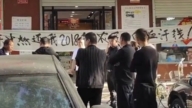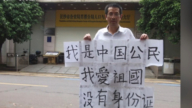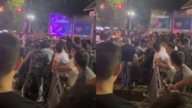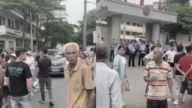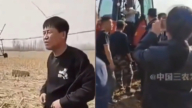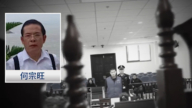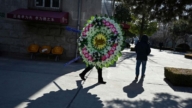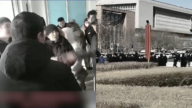【新唐人2014年11月24日訊】在被判為殺人犯槍決18年後,內蒙古少年呼格吉勒圖的案件終於等來了重審的決定書。當年,呼格吉勒圖從報案人突然變成嫌疑人,並在兩個月後就被槍決,甚至在真兇出現後的9年裡,也一直無法啟動重審。我們採訪了大陸的幾位律師,為您剖析他的案件和重審的背景。
11月20號,呼格吉勒圖父母發表了這樣一則微博:「今早8:30左右,收到內蒙古自治區高級人民法院的再審決定書,我們一家人終於看到了希望,真相終究要大白。謝謝大家的關注。」
呼格吉勒圖被槍決後,9年蒙冤,9年申冤,這個重審的消息,一家人等了18年。這一案件也被形容為「內蒙古版的聶樹斌案」。
1996年4月9號,年僅18歲的呼格吉勒圖在當地毛紡廠女廁裡,發現一具被強姦殺害的女屍,他主動找到轄區民警報案,事後被認為有作案嫌疑而遭逮捕。當時中共正在進行第二次「嚴打」。在案件證據不足並有多處疑點的情況下,案發62天後呼格吉勒圖被執行槍決。
到了2005年,內蒙古系列強姦殺人案兇手趙志紅被捕後,供認是「毛紡廠女屍案」的真兇,才引發社會關注呼格吉勒圖的冤情。
廣州律師隋牧青:「他這個現在懷疑,根本就是一個假造出來的案件。那麼如果這個能確定的話,那就是故意殺人了。那可不是枉法,濫用職權等罪名,那是故意殺人。這個案例其實按照現在聽說、看到的一些分析,是很可怕的。」
之後在2006年8月,「呼格吉勒圖案」經內蒙政法委覆核,確定為冤案。警方在調查過程中也被質疑存在刑訊逼供、誘供的行為。可是儘管呼格吉勒圖的父母常年申訴,在真兇出現後長達9年的時間裏,一直無法啟動重審,兩位老人反而被內蒙當局作為維穩對像長期監控,多次被截訪送回內蒙古。
廣州律師隋牧青:「真兇出現仍然無法申冤,因為當年辦案的那些人,他們已經因為這些案件立功陞遷。他們本身就成為了主要的一些領導者,阻力是非常大的。」
「呼格吉勒圖案」當時被列為內蒙古「嚴打」期成功案例,辦理案件的馮志明等四名警察獲二等功,並被媒體譽為「神探」。馮志明目前已升任呼和浩特市公安局黨委委員、副局長。而對該案作出「特別指示」的,當時呼和浩特市公安局的局長王智,後來升任內蒙古公安廳巡視員。
北京律師唐吉田:「如果查明這個案子當時確實他們違反法定程序,認定事實錯誤,相應的直接責任人和指揮決策者,都應該承擔相應的行政,甚至刑事責任。因為無罪之人判有罪,而且執行死刑了,這可以說是非常嚴重的事件。」
那麼為甚麼在今年年末,「呼格吉勒圖案」終於能夠重審了呢?
整理「呼格吉勒圖案」18年的始末,可以發現兩個時間點上的「巧合」。一是案發時,中共正在進行第二次全國「嚴打」,要求辦案「從重從快」。二是案件再度啟動複查時,正好是十八屆四中全會後,當局加大宣傳「依法治國」之際。
隋牧青:「現在都是因為中央開始宣傳依法治國,所以在這樣的背景下,某一些冤案都得到了解決。基本上我覺得他們運氣成分都很大。你必須要有一個制度上的保證,無論誰執政,你在法律上,這一塊東西該怎麼做就怎麼做。」
事實上,呼格吉勒圖案並不是個例,與他相似的案例,僅根據被報導出來的,就有「聶樹斌案」、「趙作海案」、「陳滿案」、「陳夏影案」等等,其他沒有被報導出的案件,數量無法掌握。
唐吉田律師認為,這類案件頻繁出現,和中國「警察主導」的刑事訴訟架構有很大關係。由於利益驅動,或非法律因素干擾,一線執法人員就可能越過法律底線,一味追求「有罪供述」。
唐吉田:「最根本的還是,在中國到目前為止,一線的執法人員,他們『無罪推定』的理念普遍是缺失的。實際上,還有像中國大陸的這種,所謂的政法委協調的機制,往往未審就先定。法院、檢察院對於警方的工作成果很難去進行非常客觀、中立的評判。」
隋牧青律師指出,儘管當局宣稱要加強法制,但近期對《刑事訴訟法》,《刑法》等提出的修訂,並沒有朝著法治方向前進,甚至很多在「開倒車」,使他對中國法律現狀並不樂觀。他認為,人們不能把自己的期望以及權利的保障,都寄託在某時某刻政治氣候的變化上。
採訪/朱智善 編輯/尚燕 後製/蕭宇
An Unjustified Execution vs. The Political Climate
A retrial of an Inner Mongolia teenager’s case was finally
granted recently after 18 years of struggle.
The teenager, Hugejiltu, became a suspect from an informant
and was executed within two months.
After the murderer confessed, the case retrial was put on hold
for more than 9 years.
We interviewed lawyers to analyze his case
and the background to the retrial.
On Nov. 20, Hugejiltu’s parents issued a microblog: “Received
notice to open retrial from the Inner Mongolia Autonomous
Region Higher People’s Court around 8:30 this morning.
We have finally seen hope for the truth.
Thanks to everyone’s concern."
For 18 years, after Hugejiltu was wrongfully executed,
his family has called for redress to no avail.
This case was described as an Inner Mongolian version
among many unjustified executions in China,
such as the Nie Shubin case.
On April 9, 1996, the then only 18-year-old factory worker,
Hugejiltu, found a female body raped and murdered
at the factory female restroom.
His voluntary report to the police turned him into a suspect
and he was arrested.
In 1996, the Communist regime was conducting its second
campaign to crack down on crime.
In spite of lack of sufficient evidence and existence of many
questions, 62 days later Hugejiltu was executed.
In 2005, the Inner Mongolia serial rape killer Zhao Zhihong
was arrested.
His confession to the 1996 rape murder case brought concern
to Hugejiltu’s family grievances.
Guangzhou lawyer Sui Muqing: “This case is a suspected fake
case. If it is confirmed, that would be an intentional murder.
It is not just bending the law or abuse of power,
but an intentional homicide.
According to the analysis we are seeing and hearing now,
it is very frightening."
In August 2006, Hugejiltu’s case was reviewed and identified
as an injustice by the Inner Mongolia Political and Law Commission.
Police were also suspected of torturing the suspect
to induce testimony.
Nine years after the murderer emerged,
the case was never re-opened.
Hugejiltu’s parents have been treated like a target for stability
maintenance.
Their petitions were often intercepted by the authorities.
Lawyer Sui Muqing: “The grievance was not redressed even
after the real murderer had confessed because those who
were promoted over the case became the authoritative leaders.
The resistance has been very big."
Hugejiltu’s case was praised as a success for the crackdown
campaign in Inner Mongolia.
Police officer Feng Zhiming and three others, honored as
the “detectives", received second class awards.
Feng Zhiming is now Party Committee and Deputy Director
of Hohhot Public Security Bureau.
Then Hohhot Public Security Bureau Director Wang Zhi
who gave special instructions for the case was promoted
to be the inspector of Inner Mongolia Public Security Bureau.
Beijing lawyer Tang Jitian: “If they are identified as the ones
who are liable for and commending the acts of violating
legal procedures, they should bear the corresponding
administrative and even criminal liability.
Because innocent people were wrongfully convicted
and even killed. This is a very serious matter."
Why is this case finally granted a retrial now?
In the past 18 years, Hugejiltu’s case is “coincidental" with two
time points.
First, the case took place during the second campaign of crack
down on crimes in the country; the regime demanded
“harsh and speedy" punishment.
Second, the re-opening of the case is granted when the regime
hyped “rule of law" after the 2014 fourth plenary session.
Sui Muqing: “It is in the context of the rule of law publicized
by the Central.
Some injustices get to be resolved.
Basically I think they are plainly lucky.
With an institutional guarantee,
those who govern need to go by law."
In fact, Hugejiltu’s case is not isolated.
There are many other known unjustified cases,
such as those of Nie Shubin, Zhao Zuohai, Chen Man,
and Chen Xiaying.
The number of unreported cases is not known.
Lawyer Tang Jitian believe the high incidence of unjustified
cases is associated with the fact that “police" lead the criminal
litigation framework under the Communist regime.
The frontline police blindly pursue confession of guilt
by bending the law driven by interest or other interfering factors.
Tang Jitian: “The most fundamental issue is that front line law
enforcement officers generally lack the concept
of “presumption of innocence."
In fact, the so-called coordination mechanism of Politics and
Law Committee often ruled before it was investigated.
It is very difficult for the court and prosecutors to carry out
an objective and impartial judgement of police work."
Sui Muqing points out, although the authorities vowed to
strengthen the rule of law, he is not optimistic about the legal
system in China.
Many of the recent amendments to Code of Criminal Procedure
and Criminal Law were actually “backsliding".
He indicates that people should not rely for protection of rights
on political climate changes.
Interview/Zhu Zhishan Edit/ShangYan Post-Production/XiaoYu


